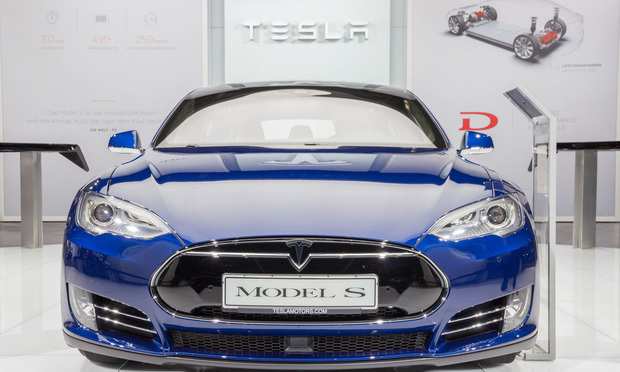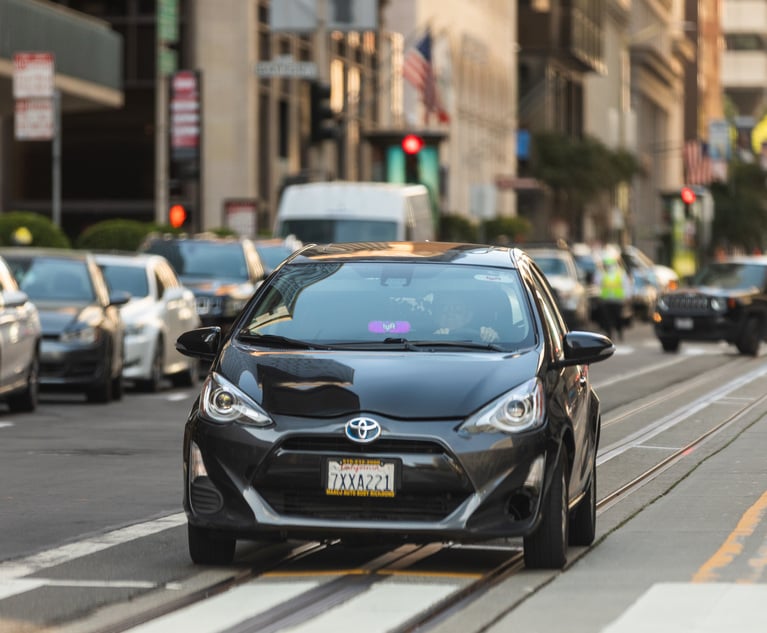Electric Vehicle Litigation—New Challenges in a Changing Landscape
Innovation in the transportation space has certainly made our lives more efficient, but it does not come without its issues.
August 28, 2019 at 11:00 AM
6 minute read
 European debut of the Tesla model S P90D at the IAA 2015. Credit: VanderWolf Images/Shutterstock.com
European debut of the Tesla model S P90D at the IAA 2015. Credit: VanderWolf Images/Shutterstock.com Stephen D. Silverman, Kimmel & Silverman
Stephen D. Silverman, Kimmel & Silverman
The prescience of good science fiction is impressive. Consider the transportation landscape. Your grandmother uses Uber, our cities have been invaded by Silicon Valley-reared scooters and those so inclined will be able to take a "flying car" from New York City to Philadelphia in less than a decade. We've long known the way we get around is changing, but the pace and novelty of the transformation has been startling.
The vehicle in your neighbor's driveway is "Exhibit A." Not long ago, its interior might have boasted USB and auxiliary ports, along with a CD player. Today, you might find a vehicle developed by Elon Musk and his engineers, featuring a massive touch-screen console and an ability to park, change lanes, brake and even drive from point A to point B without much driver input. We are all seeing more Teslas on the road. Indeed, the company's new vehicle sales have risen 900% between 2015 and 2019. This sea change, however, is not limited by brand. Deloitte, in a recent electric vehicle market report, estimates that electric vehicles will continue to precipitously and indefinitely secure increased market share in the new vehicle market, both here and abroad. The continued rise of electric and autonomous vehicle technology is an inevitability.
Innovation in the transportation space has certainly made our lives more efficient, but it does not come without its issues. Original equipment manufacturers and their suppliers are racing to develop the cutting-edge technology that consumers are clamoring for. Predictably, this drive to be first to market, coupled with the nascent nature of the technology itself, creates ample room for malfunction. Consumers, unfortunately, are often left holding the bag.
State lemon laws, contract law and a federal breach of warranty statute, the Magnuson Moss Warranty Act, can help. While they differ in scope and application, the underlying principal of each authority is the same: if an individual's vehicle suffers from a persistent issue that the manufacturer is unable to repair in a reasonable amount of time, then the aggrieved consumer is entitled to relief. Success under any state's lemon law entitles the plaintiff to a repurchase (i.e, return of the vehicle in exchange for a full refund) or replacement. Success under warranty or contract law almost always entitles a successful plaintiff to money damages.
Application of the foregoing authorities to vehicles running on an internal combustion platform is generally predictable, derived from a body of jurisprudence that has developed over a number of decades. For example, setting certain intricacies aside, a Ford Explorer suffering from a significant engine concern that a manufacturer has not repaired after three attempts would likely qualify under the Pennsylvania lemon law. Uncertainty and novel issues arise when, instead of a Ford Explorer or Chevy Malibu, the litigation concerns a Tesla Model 3 or a Nissan Leaf. In short, new technology has created new problems that attorneys and judges are just beginning to consider.
From a discovery standpoint, advanced data and remote monitoring capabilities have introduced statistics into the equation. Evidence of a given malfunction used to come mainly from testimony and sparse warranty repair records. Now, manufacturers such as Tesla are allegedly able to produce precise data, along with date and time stamps, reflective of that malfunction's occurrence. How robust and accurate this data might be is still an open question, and one to be picked apart more closely as we move further into a digital age.
By way of further example, purchasers of battery-powered electric vehicles are aware that each model is equipped with a battery that boasts a particular advertised "range." The "range" of the battery, or the distance the vehicle is able to travel between charges, is essentially akin to an internal combustion engine's gas mileage. As you might expect, Tesla and its peers monitor and compile data on their batteries as well, giving rise to similar discovery issues. All but the most fastidious consumers engage in no such monitoring. To muddy the waters further, a given battery's advertised "range" is purportedly affected by numerous external inputs, including driver behavior, weather and climate. This contention gives rise to a number of additional issues of proof and demands an enhanced level of expert sophistication.
Perhaps most concerning, however, is the increased prevalence of self-driving capabilities. Due, in part, to certain uncontrollable regulatory and infrastructure-related factors, experts and industry professionals differ wildly as to when we can expect ubiquity of truly autonomous vehicles. Tesla, however, is already at least halfway there. Their current fleet of new vehicles are all equipped with a standard "autopilot" feature, which provides adaptive cruise control and advanced lane steering technology. What's more, its range of new vehicles is also equipped with a computer chip that permits a customer to purchase "full self-driving" capabilities, which allows the driver to physically summon his vehicle with the push of a button and also provides for a limited autonomous vehicle experience. A new computer chip, which will provide enhanced autonomy, is touted as less than two years away.
These new technologies are exciting, but they do pose grave public safety risks and, once again, present a host of new questions for consumer litigators to consider. How robust and reliable is the manufacturer's data? How do all the vehicle's computer systems interact with one another, on the one hand, and the OEM's externally monitored system, on the other? How far does the consumer go in introducing statistics and data into his own case in chief? How might lemon law and breach of warranty litigation converge with personal injury and public health concerns in the future?
Our team at Kimmel & Silverman is working to answer these questions as we advocate for our clients. Lemon law and breach of warranty jurisprudence has not yet caught up to Silicon Valley, but it is on its way.
Stephen D. Silverman is an associate at Kimmel & Silverman, the oldest and largest lemon law firm in the Northeastern United States. He focuses his practice on consumer litigation and can be reached at [email protected].
This content has been archived. It is available through our partners, LexisNexis® and Bloomberg Law.
To view this content, please continue to their sites.
Not a Lexis Subscriber?
Subscribe Now
Not a Bloomberg Law Subscriber?
Subscribe Now
NOT FOR REPRINT
© 2025 ALM Global, LLC, All Rights Reserved. Request academic re-use from www.copyright.com. All other uses, submit a request to [email protected]. For more information visit Asset & Logo Licensing.
You Might Like
View All
Federal Judge Sides With Lyft Driver in Contractual Dispute Over $1M Uninsured Motorist Coverage
5 minute read
Federal Judge Sides With Insured in Dispute Over Nationwide's UIM 'Clarifications'
6 minute read
Judge Affirms $625K Jury Award to Car Salesman Accusing Phila. Dealership of Creating a Hostile Work Environment
6 minute readTrending Stories
- 1Judge Sides with Retail Display Company in Patent Dispute Against Campbell Soup, Grocery Stores
- 2Is It Time for Large UK Law Firms to Begin Taking Private Equity Investment?
- 3Federal Judge Pauses Trump Funding Freeze as Democratic AGs Launch Defensive Measure
- 4Class Action Litigator Tapped to Lead Shook, Hardy & Bacon's Houston Office
- 5Arizona Supreme Court Presses Pause on KPMG's Bid to Deliver Legal Services
Who Got The Work
J. Brugh Lower of Gibbons has entered an appearance for industrial equipment supplier Devco Corporation in a pending trademark infringement lawsuit. The suit, accusing the defendant of selling knock-off Graco products, was filed Dec. 18 in New Jersey District Court by Rivkin Radler on behalf of Graco Inc. and Graco Minnesota. The case, assigned to U.S. District Judge Zahid N. Quraishi, is 3:24-cv-11294, Graco Inc. et al v. Devco Corporation.
Who Got The Work
Rebecca Maller-Stein and Kent A. Yalowitz of Arnold & Porter Kaye Scholer have entered their appearances for Hanaco Venture Capital and its executives, Lior Prosor and David Frankel, in a pending securities lawsuit. The action, filed on Dec. 24 in New York Southern District Court by Zell, Aron & Co. on behalf of Goldeneye Advisors, accuses the defendants of negligently and fraudulently managing the plaintiff's $1 million investment. The case, assigned to U.S. District Judge Vernon S. Broderick, is 1:24-cv-09918, Goldeneye Advisors, LLC v. Hanaco Venture Capital, Ltd. et al.
Who Got The Work
Attorneys from A&O Shearman has stepped in as defense counsel for Toronto-Dominion Bank and other defendants in a pending securities class action. The suit, filed Dec. 11 in New York Southern District Court by Bleichmar Fonti & Auld, accuses the defendants of concealing the bank's 'pervasive' deficiencies in regards to its compliance with the Bank Secrecy Act and the quality of its anti-money laundering controls. The case, assigned to U.S. District Judge Arun Subramanian, is 1:24-cv-09445, Gonzalez v. The Toronto-Dominion Bank et al.
Who Got The Work
Crown Castle International, a Pennsylvania company providing shared communications infrastructure, has turned to Luke D. Wolf of Gordon Rees Scully Mansukhani to fend off a pending breach-of-contract lawsuit. The court action, filed Nov. 25 in Michigan Eastern District Court by Hooper Hathaway PC on behalf of The Town Residences LLC, accuses Crown Castle of failing to transfer approximately $30,000 in utility payments from T-Mobile in breach of a roof-top lease and assignment agreement. The case, assigned to U.S. District Judge Susan K. Declercq, is 2:24-cv-13131, The Town Residences LLC v. T-Mobile US, Inc. et al.
Who Got The Work
Wilfred P. Coronato and Daniel M. Schwartz of McCarter & English have stepped in as defense counsel to Electrolux Home Products Inc. in a pending product liability lawsuit. The court action, filed Nov. 26 in New York Eastern District Court by Poulos Lopiccolo PC and Nagel Rice LLP on behalf of David Stern, alleges that the defendant's refrigerators’ drawers and shelving repeatedly break and fall apart within months after purchase. The case, assigned to U.S. District Judge Joan M. Azrack, is 2:24-cv-08204, Stern v. Electrolux Home Products, Inc.
Featured Firms
Law Offices of Gary Martin Hays & Associates, P.C.
(470) 294-1674
Law Offices of Mark E. Salomone
(857) 444-6468
Smith & Hassler
(713) 739-1250






